Is being a Professor your dream career option? Check out the complete step by step process on how to become a Professor, Eligibility, Exams, Skills Required and Salary in 2023.
A professor is an educator at a college or university who holds the highest academic rank. For those who have an inclination towards teaching and possess good communication skills, a career as a professor is a suitable option. When it comes to the professor's salary, a candidate can earn around INR 10,17,365 per year as a professor.
There are many steps to becoming a professor, including completion of 10+2, bachelor’s & master’s degrees, followed by passing competitive exams. Candidates can also pursue a doctoral degree right after completing their master’s. In this case, they shall be exempted from taking the competitive tests & can apply directly for the post of a professor. As the final steps, aspirants must gain practical experience & start searching for jobs.
Table of Contents
- How to Become a Professor in India?
- Eligibility to Become a Professor
- Who is a Professor?
- What is the Role of a Professor?
- Types of Professors
- Skills Needed to Become a Professor
- What is the Salary of a Professor?
- Top Recruiters for a Professor
- Pros and Cons of Being a Professor
How to Become a Professor in India?
Becoming a professor requires aspirants to obtain the relevant professor qualification and clear certain entrance exams. Here is the step-by-step process that must be followed by candidates to understand how to become a college professor in India.
- Step 1: Complete 10+2
- Step 2: Obtain a Bachelor’s Degree
- Step 3: Pursue a Master’s Program
- Step 4: Crack Competitive Exams
- Step 5: Earn a Doctoral Degree
- Step 6: Gain Teaching Experience
- Step 7: Indulge in Research Work
- Step 8: Apply for Suitable Roles
Step 1: Complete 10+2
Aspirants usually wonder how to become a professor after 12th. The first step is to complete the 10+2 level in the relevant stream- arts, science, or commerce. Choosing the right subjects in class 12 will help candidates opt for the same field in their bachelor’s.
Step 2: Obtain a Bachelor’s Degree
A bachelor’s degree should be pursued in the relevant subject, and a minimum of 50-55% marks must be secured to be a professor. Candidates can choose from among the following bachelor’s courses:
|
Undergraduate Courses |
Entrance Exams |
|
Bachelor of Arts (B.A.) |
NPAT, Jain Entrance Test, DU JAT, CUET, SET |
|
Bachelor of Engineering (B.E.) |
JEE Main, JEE Advanced, BITSAT, VITEEE, MHT CET, WBJEE |
|
Bachelor of Science (B.Sc) |
TS EAMCET, KCET, JCECE, NCHMCT JEE, NPAT |
|
Bachelor of Business Administration (BBA) |
DU JAT, IPMAT, NPAT, Symbiosis Entrance Test, AIMA UGAT |
|
Bachelor of Commerce (B.Com) |
SAT, CLAT, ACLAT, CUSAT CAT |
|
Bachelor of Technology (B.Tech) |
COMEDK UGET, JEE Main, JEE Advanced, WBJEE, BITSAT, KCET |
Step 3: Pursue a Master’s Program
After completing the undergraduate professor degree, the next step is to pursue a master’s course in the right stream. It is mandatory to complete this professor course with at least 55% marks. Here is a list of a few master’s degree programs for the reference of candidates.
|
Post Graduate Course |
Entrance Exams |
|
Master of Science (M.Sc) |
BITSAT, IIT JAM, IPU CET, TISSNET, NEST, CUET PG |
|
Master of Arts (M.A.) |
PU CET, IPU CET, TISSNET, CUET PG, AIEED, CUSAT CAT |
|
Master of Commerce (M.Com) |
JUEE, PU CET , CUET PG, AKNUCET, AU CET, BHU PET |
|
Master of Technology (M.Tech) |
GATE, AP PGECET, OJEE, TS PGECET, SRMJEEE PG, IPU CET, BHU PET, TANCET, BITS HD |
|
Master of Engineering (M.E.) |
GATE, OJEE, TANCET, TS PGECET , IPU CET, PU CET, HPCET |
Step 4: Crack Competitive Exams
Once aspirants have obtained a master’s degree, it is time to take the required professor exam. They must clear the NET, the SET, or the CSIR NET exam to be eligible to apply for college professor jobs.
Those who qualify for the NET exam can apply for assistant professor roles in any university/college across the country. With the SET exam score, candidates are eligible for assistant professor posts within the state they passed the exam. At the same time, CSIR NET allows aspirants to get lecturer jobs or a junior research fellowship.
Step 5: Earn a Doctoral Degree
Most professors in India who have an inclination towards the research field hold a PhD degree. As per the new UGC guidelines, candidates with a master’s degree and a valid exam score can directly apply for assistant professor jobs. However, if they do not wish to appear for the competitive exams, a doctoral degree is a must to have.
Aspirants need to appear for PhD entrance exams like IIT JAM, GATE, and GPAT to gain admission into top colleges. A PhD course can be pursued in various fields, including Science, Engineering, Arts, Commerce & Management. Refer to the table below for more details on different PhD programs.
|
Particulars |
PhD Science |
PhD Engineering |
PhD Arts |
PhD Commerce & Management |
|
Course Duration |
3-5 Years |
2-5 Years |
3 Years |
3 Years |
|
Examination Type |
Semester Wise |
Semester Wise |
Semester Wise |
Semester Wise |
|
Eligibility Criteria |
A master’s degree in a science or technology field with at least 55 % total marks |
A master’s degree in engineering with a minimum of 55% |
A master’s degree in the relevant field with 55% minimum marks |
A master’s degree in a related discipline with an aggregate of 55% |
|
Admission Process |
Entrance Based |
Entrance Based |
Entrance Based |
Entrance Based |
|
Average Program Fee |
INR 50,000 to INR 1,00,000 |
INR 30,000 to INR 4,00,000 |
INR 15,000 to INR 2,00,000 |
INR 30,000 to INR 3,00,000 |
|
Average Salary |
INR 6-20 LPA |
INR 15 LPA |
INR 4LPA |
INR 3-40 LPA |
|
Top Recruiters |
KPMG, Google, CITI bank, BP, Apple, IBM, Atkins, AMEC, and Aecom |
Google, DRDO, HAL, Microsoft, CSIR, etc |
Colleges, Boutiques, Textile Industry, Art galleries, and Fashion Houses |
Marketing sectors, Public Sectors, Businesses, Finance sectors, etc |
Step 6: Gain Teaching Experience
Now that the candidates have obtained the necessary qualifications for being a professor, it is advisable to gain practical experience. This experience can be gained even while candidates are pursuing their education. Candidates can work as student instructors, tutor children/adults, or become part-time teachers at the initial level.
During this time, aspirants can pursue relevant certifications to gain relevant skills. With more experience, credibility, and references, candidates shall be in a better position to apply for suitable job roles. A professor usually has 3-14 years of experience in teaching and mentoring students.
Step 7: Indulge in Research Work
Get involved in writing articles, journals, academic blogs, or research papers for websites and publications. It will add substantial value to a candidate’s career as a professor.
An assistant professor can advance to the position of an associate professor by publishing a minimum of 5 high-quality research papers or books. Moreover, to qualify for a professor role from an associate professor, a minimum of 10 research publications are required.
Step 8: Apply for Suitable Roles
Lastly, candidates must be thinking about how to get the title of professor. They should now look for the availability of job roles on online portals, university websites, social media, or other networking groups. It is important to create a customised resume & cover letter for each job role and practice the common questions thoroughly.
Eligibility to Become a Professor
Any profession requires aspirants to fulfil a set of requirements. In order to become a professor, the following professor eligibility criteria must be met.
- Aspiring candidates should have completed a master’s program in the relevant field with a minimum of 55% marks. The degree must be obtained from a recognised university. Reserved categories get a relaxation of 5% in terms of the marks required.
- A valid NET, SET, or CSIR NET exam score is mandatory. However, PhD degree holders are exempted from taking the competitive exams.
- An upper age limit is not applicable to becoming a professor.
- Candidates who have teaching experience or research experience in the past get preference.
Who is a Professor?
A professor is a qualified professional who teaches students across universities and colleges. Their daily roles and responsibilities involve creating lesson plans, conducting research, assigning projects, publishing papers, etc.
Though professors gain knowledge in a wide range of subjects, they carry out research and specialise in their field of expertise. Candidates who can communicate exceptionally well and have teaching skills & subject matter expertise can consider pursuing a career as a professor in India.
What is the Role of a Professor?
A professor is involved in varied roles, including teaching, counselling, preparing reports, assisting candidates with research work, etc. Let us look into the professor job description through the points below.
- Teaching subjects, interacting with the candidates and addressing their questions and doubts
- Planning and preparing lessons, course materials, and exam papers to evaluate the progress of students
- Reviewing and modifying the existing course curriculum & teaching materials
- Carrying out research to expand their knowledge in their field
- Responsible for mentoring and training assistant professors
- Providing assistance to students with research work
- Attending various faculty, departmental, and committee meetings and conferences
- Writing and publishing research papers, articles, journals, reports, and books
- Visiting other universities and colleges to give guest lectures
How Long does it take to Become a Professor?
On average, it takes 12-14 years to become a full-time college professor. An aspirant should first pursue a 3-4 year bachelor’s degree followed by a 2-year master’s program and appear for competitive tests. Further, candidates who do not sit for the competitive exams must complete a PhD degree which will take another 3-5 years. Furthermore, good teaching experience shall be required.
Types of Professors
There are various types of professors, and each of these professors has their own set of roles and responsibilities.
1. Assistant Professor
Assistant professors guide & supervise students, assist senior professors, and provide academic support.
2. Associate Professor
They are responsible for carrying out research activities, resolving administrative matters, taking part in conferences, teaching & supervising students.
3. Researcher
Their role is to conduct research work in their area of specialisation and write and publish research papers and articles.
4. Head of Department
Short for the Head of the Department, a HOD oversees a specific education department and its management.
Skills Needed to Become a Professor
Given below is the list of all the skills and characteristics that a candidate must have in order to become a professor. Though candidates might not be born with these traits, they can acquire the skills eventually by gaining practical experience.
- Teaching skills
- Subject matter expertise
- Patience
- Optimistic approach
- Communication skills
- Determination
- Cognitive ability
- Time management skills
- Presentation skills
- Writing skills
- Problem-solving ability
- Research skills
- Critical thinking
- Willingness to learn
What is the Salary of a Professor?
The average salary of a professor in India is INR 10,17,365 PA. However, based on the job role and experience, there will be a variation in the pay packages. Let us look at the experience-wise professor salaries in India:
|
Level |
Experience (in years) |
Average Annual Salary (INR) |
|
Entry Level Professor |
Less than 1 year |
INR 4,79,616 |
|
Early Career |
1-4 years |
INR 6,00,000 |
|
Mid Career |
5-9 years |
INR 6,50,000 |
|
Experienced Professor |
10-19 years |
INR 11,81,650 |
|
Late Career |
More than 20 years |
INR 18,73,059 |
Candidates willing to build a career as a professor must also look into the job profile-wise salary data below.
|
Job Profile |
Average Annual Salary (INR) |
|
Assistant Professor |
INR 5,11,686 |
|
Adjunct Professor |
INR 5,57,296 |
|
Associate Professor |
INR 11,10,222 |
|
Researcher |
INR 7,85,423 |
Top Recruiters for a Professor
When it comes to professor recruitment, aspirants can avail of various job opportunities in government & private educational institutes. The following organisations hire professors across the country:
- Private Institutions
- College and Universities
- Research-Based Institutions
- Government Institutions
- Coaching Institutes
Pros and Cons of Being a Professor
The journey to becoming a professor requires a lot of hard work and perseverance. It is essential for students to check the professor eligibility before embarking on their career as a professor.
Pros of Becoming a Professor
- Respectable Profession: A professor possesses a good amount of knowledge and is involved in mentoring & tutoring students. Thus, candidates shall get huge respect in society as a professor.
- Intellectual Freedom: College professors develop curricula as per the requirements of students and get to choose the study materials involved. Further, they can research any topic as per their expertise and use various research initiatives and methodologies.
- Teaching and Mentoring: It is highly rewarding to provide knowledge and guidance to students. Also, there is a lot of learning involved in this profession.
- Travel Opportunities: As a professor, candidates will have to attend several conferences and meetings. This way, they can interact and explore with people from different cultural backgrounds.
Cons of Becoming a Professor
- High Competition: Candidates aspiring to become professors must note that there is vast competition in this field. The number of professor roles available at educational institutes is limited.
- Lack of job security: Due to competition, it becomes quite challenging for professors to secure a permanent role at an educational institute. They might continue working as lecturers or visiting professors.
- Low compensation: When compared to other professions, the salaries are low for professors. However, in private sector roles, professors are paid well based on their experience, past record, research contributions, etc.
- Work-life balance: There are multiple duties of a professor, including teaching, writing research papers, checking answer sheets, and other administrative roles. Due to this, they might need to work extra hours, which affects their work-life balance.


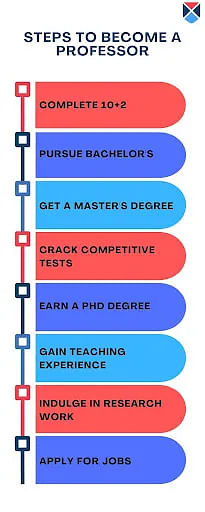
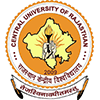

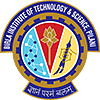

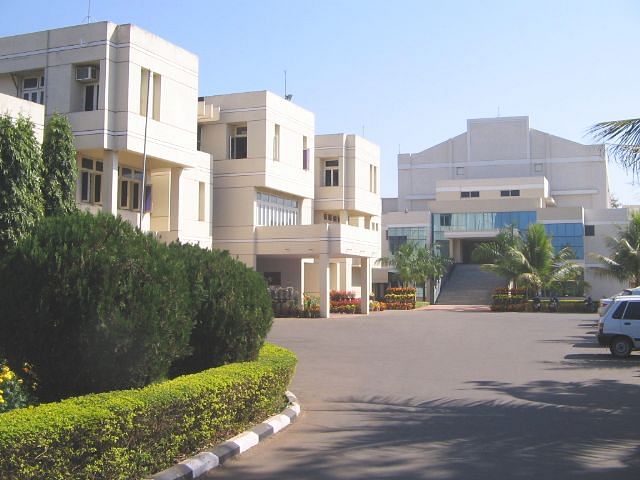
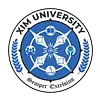











POST YOUR COMMENT